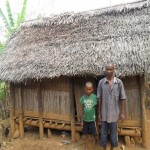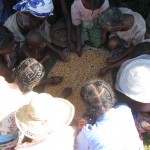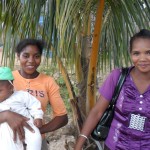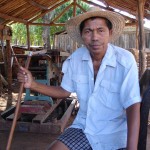
In Madagascar, the island nation off the east coast of Africa, most farmers cannot grow enough to feed their families for an entire year. Since 2009, a USAID program, implemented by CARE, works in the most rural and poverty stricken regions of Madagascar to teach farmers new farming methods and link them together to improve production.

In a small village in southeastern Madagascar, a group of 20 single women are working together to increase their incomes and their independence. For the past two years, they have benefited from a USAID program to improve food security and nutrition among nearly 100,000 vulnerable households.

When Erline in Madagascar became pregnant with her first child, her family preferred that she give birth at home because it was less expensive than visiting a health center. After all, a traditional birth attendant typically charges $5—about an average week’s pay—while a birth at a facility would require transport, food and medicine costs, and cost three to four times that amount. However, a visit from a USAID-trained community health worker helped Erline and her family understand the risks of giving birth outside a health facility. And ultimately, when they considered the health of Erline and her baby, they chose the safer option.

Feroce - ferocious in French, and he carries his name well - wears a thin blue shirt and sits in the shade to direct his four workers with wide swipes of his wooden cane. His workers are assembling plows and pumps, welding metal together. He has to speak loudly to cover the rat-rat-tat of his generator, isolated in a clean, cool hut at the edge of his large courtyard, packed with green foot pumps and ploughs. Feroce's workshop is the only house with electricity for miles. Through a USAID-funded program, CARE International installed reliable and hardy foot pumps in villages scattered throughout Amboasary and Ambovombe districts, in Madagascar. As part of the project, experts trained Feroce on how to build, sell and maintain these high-quality pumps. His business has grown so swiftly that he works fulltime for his workshop.








Comment
Make a general inquiry or suggest an improvement.